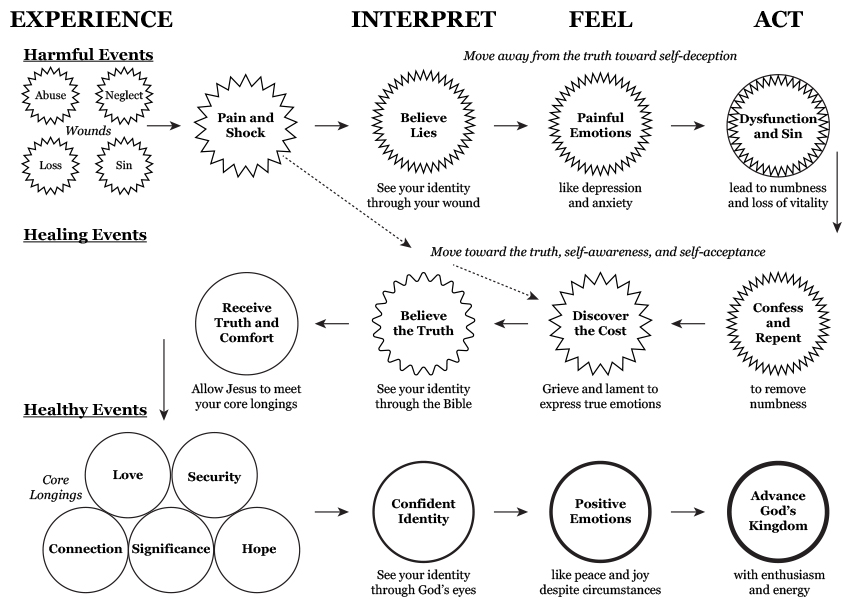Reading time: 4 minutes
How well do you feel truly understood? On a quest to be understood, you’ll probably first need to pursue understanding yourself. You might find yourself asking a series of progressive questions:
- How well do I feel understood?
- What has happened to me in the last several months?
- Have I talked with anyone about what is going on with me?
- How well do I know what is going with me? How well can I explain it to someone else?
- Could others not understand because they do not consider understanding me a priority for them?
- Does anyone care about me?
You might not be on others’ radar, but you should be on your radar. Others might be consumed with their own thoughts or pursuits. If you want to be understood, seek to understand yourself and learn how to communicate your insight to others.
Getting Understanding Is Half The Battle
Having a clear understanding means you have an accurate assessment of any given situation. Then, with God’s motivation to do what is best, you should be able to choose a positive step forward.
Get wisdom, get understanding;
Proverbs 4:5-9 NIV
do not forget my words or turn away from them.
Do not forsake wisdom, and she will protect you;
love her, and she will watch over you.
The beginning of wisdom is this: Get wisdom.
Though it cost all you have, get understanding.
Cherish her, and she will exalt you;
embrace her, and she will honor you.
She will give you a garland to grace your head
and present you with a glorious crown.”
Of course, when God is involved, the best way forward is a step of faith as you trust Him. One of the best wise sayings is to not lean on your own understanding. That’s because only God has complete understanding. When you are able to follow God along your confusing (crooked?) path, then you have wisdom and understanding.
Trust in the Lord with all your heart
Proverbs 3:5-6 NIV
and lean not on your own understanding;
in all your ways submit to him,
and he will make your paths straight.
God doesn’t expect us to understand the course of our life apart from Him.
A person’s steps are directed by the LORD. How then can anyone understand their own way?
Proverbs 20:24 NIV
Getting wisdom doesn’t mean you automatically understand everything, but it does mean you’ll be able to lean into God.
Understanding Yourself Is A Prerequisite
You might not be able to figure out your way, at least not with absolute certainty, but you can better know yourself. Before you can attempt to understand someone else, you need to understand yourself (so you can relate). Before someone else can understand you, you need to understand yourself (so you can share yourself with others).
What happens if you don’t know yourself very well? Others can observe your behaviors and offer their best guess about what is going on with you. God can teach you about yourself through others, but you always have the ability to choose your opinion over other’s opinion.
Sometimes adversity can force you to find yourself. That’s where the saying, “Let’s see what you’re made of” comes from. As you rise to meet challenges, your identity becomes clearer.
Counseling Helps You Gain Understanding
When I am counseling others, one of my main goals is to help my clients become more in touch with who they are. While there are various techniques to achieve this, the simplest might be curiosity. When I am curious about my clients, it helps them to find their voice, opinions, and preferences. Often, if a person doesn’t sense anyone will understand, they don’t bother trying to understand themselves. This means a lot of potential remains untapped.
When God created each one of us, He created a seed of our identity. At conception, we are like a seed. The seed defines our identity, but it needs time to grow into the intended target. Never looking into who you are is like not planting the seed or like receiving a gift but never opening it.
To better understand yourself, experiment by trying a new activity or an old one in a new way. Consider what you learn from it. Then pick something else new and repeat.
If you become lost during your life journey, try explaining yourself to someone else who doesn’t know you very well. Hopefully you’ll figure out that you had the answer within you all along, you just needed some help getting to it. Give yourself this opportunity to discover more of who God made you to be.
Read more about knowing yourself.
Image by ashish choudhary from Pixabay







